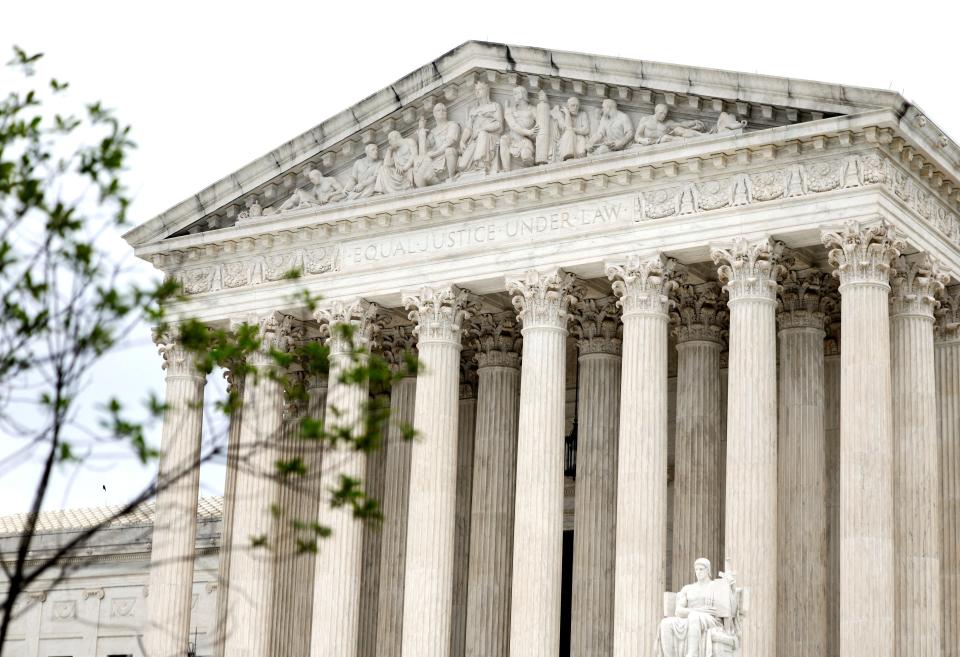Supreme Court decision saves Trump-era tax change, dodges big loss in federal tax revenue
- Oops!Something went wrong.Please try again later.
- Oops!Something went wrong.Please try again later.
- Oops!Something went wrong.Please try again later.
- Oops!Something went wrong.Please try again later.
WASHINGTON − The Supreme Court on Thursday upheld a controversial Trump-era tax on foreign income, a win for the federal government, which had warned the failed challenge could have cost it hundreds of billions – and perhaps trillions – of dollars in tax revenue.
Although the case was viewed by some as a proxy debate for a wealth tax Democrats have floated for the ultra-rich, the Supreme Court emphasized that the decision does not address the questions that would raise.
"Those are potential issues for another day," Justice Brett Kavanaugh wrote for the majority.
Still, one group advocating for a wealth tax viewed the ruling as a victory.
“Today's Moore decision means the fight to tax wealth and rein in billionaire power is alive and well, and political leaders should make that a priority in the 2025 tax fight,” said Adam Green, co-founder of the Progressive Change Campaign Committee.
Thomas Berry, a scholar at the conservative Cato Institute, called it unfortunate that the court didn’t firmly close the door on a wealth tax.
“But it is important to recognize that it has not opened that door either,” Berry said.
More: Supreme Court dropping decisions on guns, abortion, Trump immunity and more in coming days
The court ruled 7-2 against Charles and Kathleen Moore, a retired couple from Washington state who challenged their $14,729 tax bill on an investment they made in a company in India.
A massive change in tax laws passed by a GOP Congress and signed by former President Donald Trump in 2017 reduced the corporate tax rate and included a one-time tax on earnings of U.S. shareholders in some foreign companies.
Before the law, companies could defer indefinitely paying U.S. taxes on foreign earnings by parking the profits abroad.
The Moores argued the tax was unconstitutional under the 16th Amendment, which allows the government to tax income. Because their profits in the form of dividends were reinvested into the company, the couple said, the earnings can’t be considered income for tax purposes.
The Biden administration, which defended the tax provision because of its concern about upending federal taxes, countered that nothing in the Constitution bars Congress from taxing unrealized income. The Justice Department also said similar taxes have been in place since the mid-19th century.
The lower courts sided with the administration, and the Moores appealed to the Supreme Court.
A majority upheld the lower courts' decision, saying the company generated income that Congress can attribute to shareholders and partners for tax purposes, even if the income has not been distributed.
"Consistent with this Court's case law, Congress has long taxed the shareholders and partners of business entities on the entities' undistributed income," Kavanaugh wrote. "That longstanding congressional practice reflects and reinforces this Court's precedents upholding those kinds of taxes."
If the Moores' argument were taken to its logical conclusion, Kavanaugh continued, vast swaths of the tax code could be rendered unconstitutional.
"The logical implications of the Moores’ theory would therefore require Congress to either drastically cut critical national programs or significantly increase taxes on the remaining sources available to it — including, of course, on ordinary Americans," Kavanaugh wrote.
In a dissent joined by Justice Neil Gorsuch, Justice Clarence Thomas said the Moores never received any of their investment gains so they cannot be taxed on them.
Thomas says the majority is 'changing the subject'
Thomas accused the majority of "changing the subject" to uphold the tax through an "unsupported invention."
And he scoffed at his colleagues' effort to write a narrow opinion to avoid weighing in on a wealth tax.
"Sensing that upholding the (Mandatory Repatriation Tax) cedes additional ground to Congress, the majority arms itself with dicta to tell Congress `no' in the future," Thomas wrote. "But, if the Court is not willing to uphold limitations on the taxing power in the expensive cases, cheap dicta will make no difference."
More: This couple is fighting $15,000 in taxes. Their case could cost Washington trillions

During the December oral arguments, the justices appeared to be searching for a narrow way to decide the case.
If the court invalidated the tax, the Justice Department warned, the government could lose $340 billion. In addition, a broader ruling invalidating all taxes on undistributed business earnings could have cost several trillions of dollars in lost tax revenue, the government said.
"An opinion in favor of the Moores had the potential to upend many areas of current U.S. tax law, not to mention the flurry of refund claims, including those already filed on a protective basis, that would have created significant burdens on an already resource strapped IRS," said Christine K. Lane, an expert on tax law at Crowell & Moring.
The Moores were backed by anti-regulatory and business groups.
Calls for Justice Samuel Alito to recuse himself from the case
Justice Samuel Alito rebuffed calls from Senate Democrats that he not participate in the case after speaking with one of the lawyers, David Rivkin, who represented the Moores. Rivkin co-authored two favorable opinion pieces in the Wall Street Journal last year based on his interviews with Alito.
Pushing back, Alito said there was “no valid reason” to recuse himself as he and Rivkin never discussed the case. Rivkin, Alito said, was acting as a journalist when they talked and justices have routinely been interviewed by attorneys who practice before the court.
This article originally appeared on USA TODAY: Supreme Court decision saves Trump-era tax on Americans' foreign earnings

